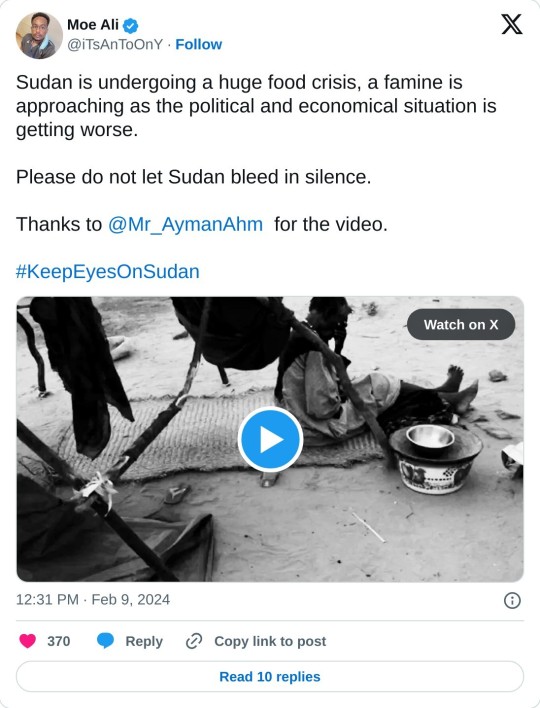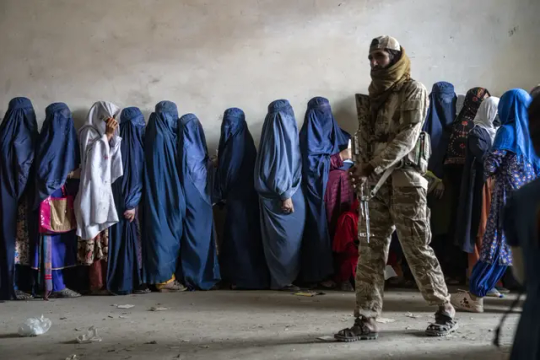#Global Women
Text



NUMEROUS injustices are continually being committed against Sudanese people. I implore you to stay informed about this. There are many resources people have shared on this platform -some I have re-posted and others I have personally uploaded. Please keep talking about Sudan. The RSF must be stopped, and the countries supporting this violence must also be held accountable.
This is also happening in a few weeks, so please spread the word/attend if you're able to. All out for Sudan:

#feminist#social justice#eyes on sudan#keep eyes on sudan#sudan genocide#sudan#sudan crisis#liberate sudan#free sudan#tw sex trafficking#khartoum#violence against women#telecommunications blackout#telecommunications#global news#current events#current news#human rights violations#washington#protest#all out for sudan
685 notes
·
View notes
Text
One of the points of Greta Thunberg's book about the Climate, was about female land ownership, and how we need an increase of it. That actually surprised me, not that I didn't think of it before, but because it was presented as one of the solutions.
Greta actually looked at what happens to the land when women reign over it, or when women even just have access to it and are allowed to work on it, and noticed that women almost always, naturally, regenerated the land. Women will go and plant trees on their land immediately, and feed their families with the produce it makes. Women will not even stop at planting trees on their land, they'll go and re-forest the surrounding areas too, sharing secrets of the trees with others who can benefit from the extra free food. Women will plant native species, bushes, flowers, gardens, revitalize the soil, add life to the dirt and the sand, and this is something that is recorded consistently and long term with the female land ownership, land is not only regenerated, but used for immediate benefit of all life on it. That includes humans, animals, bugs, bacteria, plants and the local environment in general.
Greta also points out that most of the land that women are working on, is currently not their own. They're most often lending their hands to the land owned by their husbands, brothers, uncles, relatives or landlords, and these m*n will sometimes decide to undo all that work, and build something environmentally destructive on it in order to make a personal profit.
This is why Greta implores that is important that women own more land, personally and with full power over what happens to it. Women having full control over land is nature's way of regeneration and prevention of climate change. Give land to the women to fight climate change.
3K notes
·
View notes
Text


By EDITH M. LEDERER Updated 9:11 PM PST, March 8, 2024
UNITED NATIONS (AP) —
Legal equality for women could take centuries as the fight for gender equality is becoming an uphill struggle against widespread discrimination and gross human human rights abuses, the United Nations chief said on International Women’s Day.
Secretary-General Antonio Guterres told a packed U.N. commemoration Friday that “a global backlash against women’s rights is threatening, and in some cases reversing, progress in developing and developed countries alike.”
The most egregious example is in Afghanistan, he said, where the ruling Taliban have barred girls from education beyond sixth grade, from employment outside the home, and from most public spaces, including parks and hair salons.
At the current rate of change, legal equality for women could take 300 years to achieve and so could ending child marriage, he said.
Guterres pointed to “a persistent epidemic of gender-based violence,” a gender pay gap of at least 20%, and the underrepresentation of women in politics. He cited September’s annual gathering of world leaders at the U.N. General Assembly, where just 12% of the speakers were women.
“And the global crises we face are hitting women and girls hardest — from poverty and hunger to climate disasters, war and terror,” the secretary-general said.
In the past year, Guterres said, there have been testimonies of rape and trafficking in Sudan, and in Gaza women women and children account for a majority of the more than 30,000 Palestinians reported killed in the Israeli-Hamas conflict, according to the Gaza Ministry of Health.
He cited a report Monday by the U.N. envoy focusing on sexual violence in conflict that concluded there are “reasonable grounds” to believe Hamas committed rape, “sexualized torture” and other cruel and inhumane treatment of women during its surprise attack in southern Israel on Oct. 7. He also pointed to reports of sexual violence against Palestinians detained by Israel.
International Women’s Day grew out of labor movements in North America and across Europe at the turn of the 20th century and was officially recognized by the United Nations in 1977. This year’s theme is investing in women and girls to accelerate progress toward equality.
Roza Otunbayeva, the head of the U.N. political mission in Afghanistan, told the Security Council on Wednesday that what is happening in that country “is precisely the opposite” of investing in women and girls.
There is “a deliberate disinvestment that is both harsh and unsustainable,” she said, saying the Taliban’s crackdown on women and girls has caused “immense harm to mental and physical health, and livelihoods.”
Recent detentions of women and girls for alleged violations of the Islamic dress code “were a further violation of human rights, and carry enormous stigma for women and girls,” she said. It has had “a chilling effect among the wider female population, many of whom are now afraid to move in public,” she said.
Otunbayeva again called on the Taliban to reverse the restrictions, warning that the longer they remain, “the more damage will be done.”
Sima Bahous, the head of UN Women, the agency promoting gender equality and women’s rights, told the commemoration that International Women’s Day “sees a world hobbled by confrontation, fragmentation, fear and most of all inequality.”
“Poverty has a female face,” she said. “One in every 10 women in the world lives in extreme poverty.”
Men not only dominate the halls of power but they “own $105 trillion more wealth than women,” she said.
Bahous said well-resourced and powerful opponents of gender equality are pushing back against progress. The opposition is being fueled by anti-gender movements, foes of democracy, restricted civic space and “a breakdown of trust between people and state, and regressive policies and legislation,” she said.
[Click on the link to continue reading]
#women's rights#femicide#taliban#women's oppression#international women's day#global feminism#feminism
291 notes
·
View notes
Text
[The first video shows people marching at night. The second video shows a group of women praying.]
🚨 A mass march has erupted now headed towards the zionist embassy in the Jordanian capital of Amman in anger at the IOF's crimes in Gaza—including the rape and killing of women, the siege of Al-Shifa Hospital, and the violations of Al-Aqsa—and in support of the resistance.
Meanwhile, women staged a sit-in to denounce the occupation's crimes and support the women of Gaza.
#palestine#free palestine#gaza#free gaza#jerusalem#israel#tel aviv#gaza strip#from the river to the sea palestine will be free#joe biden#benjamin netanyahu#al aqsa mosque#al shifa hospital#gaza news#gaza genocide#palestinian genocide#news#breaking news#global news#social justice#prayer#protest#jordan#iof war crimes#iof terrorism#feminism#women's rights#eurovision 2024#eurovision song contest#eurovision
198 notes
·
View notes
Text


Ms. Sethii
#ms sethii#curvy af#curvy and beautiful#curvalicious#curvy and cute#curvy body#curvy chicks#curvy#global beauties#indian women#indian
189 notes
·
View notes
Text
Shame upon the whole world
A harrowing description of sexual abuse and humiliation done by the IOF against Palestinian civilians, with the video embeded for convienience
#palestine#free gaza#free palestine#gaza#global news#ceasefire#current events#ceasefire now#i stand with palestine#palestinian women#palestinian families#israel crimes#war crimes#call for action#call for ceasefire#please share#please reblog#spread awareness#use your voice#dont look away#from the river to the sea 🇵🇸#stand with palestine#gaza strip#tiktok#videos#viralpost#world news#bisan gaza#stop the occupation#stop the genocide
101 notes
·
View notes
Note
Usually everyone agrees that Omar is an exceptionally beautiful human, but one time on I think reddit someone said there are a million Omars walking around Latin America and he is nothing special and I was like WHAT
WHAAAAAAAAT??? WHERE??? WHERE IN LATIN AMERICA????
They're lying and it's such a ridiculous thing to say OMG I get that not everyone can be into him but saying he's nothing special??? That's blasphemous!
Look, I live in like the 6th most populated city in Latin America and it's fairly diverse in terms of the amount of Latin American immigrants that live here. Coincidentally, a large part of those people are from Venezuela... I've lived here for two years full time, I ride the always full subway every day and have never ever seen someone as beautiful as Omar Rudberg. Like I wish!!
I also visited México City in November last year and no, sorry, no one compared to Omar's beauty either.
I'm from a smaller city in Chile and there, I know men that look like Pedro Pascal and Oscar Isaac lmao like your average looking Latino who's handsome if you like their style? Diego Luna too, who looks exactly as one of my old uni classmates. Funnily enough there's always a Pedro Pascal double contest going on somewhere here, with thousands of contestants lmao 😭
And like OKAY I know I'm biased AF but Omar isn't just handsome. He's beautiful. Even lesbians think he's beautiful, come on!
He's aesthetically pleasing, as my very lesbian sister says, and no, you just can't find anyone that looks like Omar here. Curly haired, brown men? Sure. But as GORGEOUS as him? Not at all.
If I ever find someone as beautifull as Omar, I'll let you all know!
For now, there's only one Omar Rudberg and he's more beautiful than all the other men out there!
Whoever said that is a lying liar who lies.


With make up, without make up? GORGEOUS!
No Omar slander on my watch! 🙅🏾♀️🙅🏾♀️
#Respondiendo#Omar Rudberg#A MILLION OMAR???? THATS RIDICULOUS!#Ask women in Latin America how they think Latinos rank in the global handsomeness scale 💀💀💀#Yeah I'm a fan of Omar but other people have told me he's beautiful and they're not remotely into him lol#OH GOD#I just realized The Neck™ gif also has Stubble™#do you mind if I scream?
87 notes
·
View notes
Text
gyns, new book just dropped
by which I mean, Maria Mies just died this year, and I didn't know anything about her or her work????? how did I not fucking know about this book that was published in 1986???? This should be part of the main radfem cannon.
Vandana Shiva said about Maria Mies:
"Maria showed us that capitalist patriarchy is an extractive economy that extracts the value women create and creates the illusion that capital is the creative force that creates wealth."
anyways, sharing with you all
edited to add that the borrow linked above is unavailable, here’s a direct (safe) link to a pdf
#radfem#feministdragon#radical feminism#women's liberation#women's rights#maria mies#the global commons
145 notes
·
View notes
Text

International women's day is coming up and I can't stop thinking about how many women will continue to be globally ignored by western/european powers. I anticipate women across the politician spectrum will be rejoicing how 'far women have come,' without being critically reflexive of how they are often complicit in the empire they reside in -without even blinking towards the women suffering and being killed, raped, and genocided right now in Sudan, as well as in Palestine and the Congo. It's all despicable.
The RSF must be stopped. This terror and violence must end. Sudan will be free.
#feminist#feminism#social justice#current events#tw sa mention#sudan genocide#sudan war#eyes on sudan#sudan crisis#free sudan#keep eyes on sudan#sudan#global news#rsf#gender violence#violence against women#international women's day#tw sex trafficking#womens day
302 notes
·
View notes
Text
Data spanning from 1995 to 2021 in India revealed a striking gender imbalance in organ transplants, with four men getting organ transplants for every woman. A total of 36,640 transplants took place in this period, out of which 29,000 were for men and 6,945 for women.
This substantial difference is attributed to a complex interplay of economic responsibilities, societal pressures, and deeply ingrained preferences.
Dr Anil Kumar, director of the government-run National Organ & Tissue Transplant Organisation (NOTTO) highlighted this significant aspect of the organ donation landscape.
While more men contribute as cadaver donors, a staggering 93 per cent of total organ donations in the country come from living donors, he told the Times of India newspaper.
This hints at a trend: a majority of living organ donors are women.
Socio-economic factors a driving force for women donors?
A study published in the Experimental and Clinical Transplantation Journal in 2021 delved into the intricacies of living organ transplantation in India.
The findings showed that 80 per cent of living organ donors are women, predominantly wives or mothers.
The socio-economic pressure on women to assume caregiving roles within the family emerges as a primary factor, compelling them to step forward as donors.
Men's reluctance in surgery
In many cases, men, often the primary breadwinners, hesitate to undergo surgery, contributing to the gender gap in organ recipients.
The study highlights that when the recipient is a male breadwinner, family members, especially wives or parents, feel a heightened responsibility to donate organs.
Emotional dynamics
The emotional dynamics surrounding organ donation are intricate. Women recipients, in particular, may experience guilt when their family members, especially wives or mothers, become donors.
This reluctance leads to a scenario where women recipients may find themselves on waiting lists.
Notably, Karnataka has topped the charts in organ donation in the past decade. The number of donations have risen from 102 in 2013 to 765 in the first 10 months of 2023.
A user on Ovarit added this helpful context:
"Just a little more context to this: men produce male-specific proteins (on the Y chromosome) which often get rejected by women's bodies. Since males have an X chromosome, their bodies recognize proteins from female donors. This makes it more difficult for women to receive male tissue/organs, while still being acceptable candidates for donating to men. Even still, these ratios are very disproportionate".
"As women we absolutely need to be aware of our vulnerability of being used as spare parts in a man's world. Especially when we are being socialized into believing that we need to sacrifice our bodies and lives for others- and society has developed a sense of entitlement to this sacrifice, while downplaying the suffering of women."
#organ donation#marxist feminism#India#women's rights#feminism#global feminism#intersectional feminism#women's oppression#patriarchy#sex-based oppression#gender critical#gender critical feminism#radblr
607 notes
·
View notes
Text
🇮🇱⚔️🇵🇸 🚨
PALESTINIAN YOUTH ATTEMPTS TO RETRIEVE THE BODY OF CIVILIAN SHOT AND KILLED BY ZIONIST SNIPER
📹 A Palestinian youth attempts to retrieve the corpse of a man shot and killed by a Zionist sniper in the Gaza Strip.
The video shows the youth as he crawls on his stomach over the rubble of Palestinian homes as he tries to retrieve the body of man who was killed by Israeli snipers perched on nearby rooftops.
As the youth crawls towards the body of the man, occupation snipers continue to fire towards him, forcing the young man to retreat to safety.
#source
@WorkerSolidarityNews
#gaza#gaza strip#gaza news#gaza war#gaza genocide#genocide in gaza#genocide#genocide of palestinians#israeli genocide#israeli war crimes#war crimes#crimes against humanity#israel#israeli occupation#israeli women#israeli occupation forces#palestine#palestine news#palestinians#free palestine#israel palestine conflict#war#politics#news#geopolitics#world news#global news#international news#breaking news#current events
48 notes
·
View notes
Text


Lexi Baebie
#lexi baebie#curvy af#curvy and beautiful#curvalicious#curvy body#curvy and cute#curvy chicks#global beauties#curvy#fine ass women
37 notes
·
View notes
Text
✨️WOMEN✨️

#that's it#that's the post#i love women#qqgk#quan qiu gao kao#global examination#global university entrance examination#全球高考#danmei novels#danmei
59 notes
·
View notes
Text
"If I wanted to convince you of the reality of human progress, of the fact that we as a species have advanced materially, morally, and politically over our time on this planet, I could quote you chapter and verse from a thick stack of development statistics.
I could tell you that a little more than 200 years ago, nearly half of all children born died before they reached their 15th birthday, and that today it’s less than 5 percent globally. I could tell you that in pre-industrial times, starvation was a constant specter and life expectancy was in the 30s at best. [Note: This is average life expectancy, old people did still exist in olden times] I could tell you that at the dawn of the 19th century, barely more than one person in 10 was literate, while today that ratio has been nearly reversed. I could tell you that today is, on average, the best time to be alive in human history.
But that doesn’t mean you’ll be convinced.
In one 2017 Pew poll, a plurality of Americans — people who, perhaps more than anywhere else, are heirs to the benefits of centuries of material and political progress — reported that life was better 50 years ago than it is today. A 2015 survey of thousands of adults in nine rich countries found that 10 percent or fewer believed that the world was getting better. On the internet, a strange nostalgia persists for the supposedly better times before industrialization, when ordinary people supposedly worked less and life was allegedly simpler and healthier. (They didn’t and it wasn’t.)
Looking backward, we imagine a halcyon past that never was; looking forward, it seems to many as if, in the words of young environmental activist Greta Thunberg, “the world is getting more and more grim every day.”
So it’s boom times for doom times. But the apocalyptic mindset that has gripped so many of us not only understates how far we’ve come, but how much further we can still go. The real story of progress today is its remarkable expansion to the rest of the world in recent decades. In 1950, life expectancy in Africa was just 40; today, it’s past 62. Meanwhile more than 1 billion people have moved out of extreme poverty since 1990 alone.
But there’s more to do — much more. That hundreds of millions of people still go without the benefit of electricity or live in states still racked by violence and injustice isn’t so much an indictment of progress as it is an indication that there is still more low-hanging fruit to harvest.
The world hasn’t become a better place for nearly everyone who lives on it because we wished it so. The astounding economic and technological progress made over the past 200 years has been the result of deliberate policies, a drive to invent and innovate, one advance building upon another. And as our material condition improved, so, for the most part, did our morals and politics — not as a side effect, but as a direct consequence. It’s simply easier to be good when the world isn’t zero-sum.
Which isn’t to say that the record of progress is one of unending wins. For every problem it solved — the lack of usable energy in the pre-fossil fuel days, for instance — it often created a new one, like climate change. But just as a primary way climate change is being addressed is through innovation that has drastically reduced the price of clean energy, so progress tends to be the best route to solving the problems that progress itself can create.
The biggest danger we face today, if we care about actually making the future a more perfect place, isn’t that industrial civilization will choke on its own exhaust or that democracy will crumble or that AI will rise up and overthrow us all. It’s that we will cease believing in the one force that raised humanity out of tens of thousands of years of general misery: the very idea of progress.
Changing Humanity's "Normal" Forever
Progress may be about where we’re going, but it’s impossible to understand without returning to where we’ve been. So let’s take a trip back to the foreign country that was the early years of the 19th century.
In 1820, according to data compiled by the historian Michail Moatsos, about three-quarters of the world’s population earned so little that they could not afford even a tiny living space, some heat and, hopefully, enough food to stave off malnutrition.
It was a state that we would now call “extreme poverty,” except that for most people back then, it wasn’t extreme — it was simply life.
What matters here for the story of progress isn’t the fact that the overwhelming majority of humankind lived in destitution. It’s that this was the norm, and had been the norm since essentially… forever. Poverty, illiteracy, premature death — these weren’t problems, as we would come to define them in our time. They were simply the background reality of being human, as largely unchangeable as birth and death itself...
Between 10,000 BCE and 1700, the average global population growth rate was just 0.04 percent per year. And that wasn’t because human beings weren’t having babies. They were simply dying, in great numbers: at birth, giving birth, in childhood from now-preventable diseases, and in young adulthood from now-preventable wars and violence.
It was only with the progress of industrialization that we broke out of [this long cycle], producing enough food to feed the mounting billions, enough scientific breakthroughs to conquer old killers like smallpox and the measles, and enough political advances to dwindle violent death.
Between 1800 and today, our numbers grew from around 1 billion to 8 billion. And that 8 billion aren’t just healthier, richer, and better educated. On average, they can expect to live more than twice as long. The writer Steven Johnson has called this achievement humanity’s “extra life” — but that extra isn’t just the decades that have been added to our lifespans. It’s the extra people that have been added to our numbers. I’m probably one of them, and you probably are too...
The progress we’ve earned has hardly been uninterrupted or perfectly distributed... [But] once we could prove in practice that the lot of humanity didn’t have to be hand-to-mouth existence, we could see that progress could continue to expand.
Current Progress "Flows Overwhelmingly" to the Developing World
The long twentieth century came late to the Global South, but it did get there. Between 1960 and today, India and China, together home to nearly one in every three people alive today, have seen life expectancy rise from 45 to 70 and 33 to 78, respectively. Per-capita GDP over those years rose some 2,600 percent for India and an astounding 13,400 percent for China, with the latter lifting an estimated 800 million people out of extreme poverty.
In the poorer countries of sub-Saharan Africa, progress has been slower and later, but shouldn’t be underestimated. When we see the drastic decline in child mortality — which has fallen since 1990 from 18.1 percent of all children in that region to 7.4 percent in 2021 — or the more than 20 million measles deaths that have been prevented since 2000 in Africa alone, this is progress continuing to happen now, with the benefits overwhelmingly flowing to the poorest among us.
Vanishing Autocracies
In 1800, according to Our World in Data, zero — none, nada, zip — people lived in what we would now classify as a liberal democracy. Just 22 million people — about 2 percent of the global population — lived in what the site classifies as “electoral autocracies,” meaning that what democracy they had was limited, and limited to a subset of the population.
One hundred years later, things weren’t much better — there were actual liberal democracies, but fewer than 1 percent of the world’s population lived in them...
Today just 2 billion people live in countries that are classified as closed autocracies — relatively few legal rights, no real electoral democracy — and most of them are in China...
Expanding Human Rights
All you have to do is roll the clock back a few decades to see the way that rights, on the whole, have been extended wider and wider: to LGBTQ citizens, to people of color, to women. The fundamental fact is that as much as the technological and economic world of 2023 would be unrecognizable to people in 1800, the same is true of the political world.
Nor can you disentangle that political progress from material progress. Take the gradual but definitive emancipation of women. That has been a hard-fought, ongoing battle, chiefly waged by women who saw the inherent unfairness of a male-dominated society.
But it was aided by the invention of labor-saving technologies in the home like washing machines and refrigerators that primarily gave time back to women and made it easier for them to move into the workforce.
These are all examples of the expansion of the circle of moral concern — the enlargement of who and what is considered worthy of respect and rights, from the foundation of the family or tribe all the way to humans around the world (and increasingly non-human animals as well). And it can’t be separated from the hard fact of material progress.
Leaving a Zero-Sum World Behind
The pre-industrial world was a zero-sum one... In a zero-sum world, you advance only at the expense of others, by taking from a set stock, not by adding, which is why wars of conquest between great powers were so common hundreds of years ago, or why homicide between neighbors was so much more frequent in the pre-industrial era.
We have obviously not eradicated violence, including by the state itself. But a society that can produce more of what it needs and wants is one that will be less inclined to fight over what it has, either with its neighbors or with itself. It’s not that the humans of 2023 are necessarily better, more moral, than their ancestors 200 or more years ago. It’s that war and violence cease to make economic sense...
Doomerism, at its heart, may be that exhaustion made manifest.
But just as we need continued advances in clean tech or biosecurity to protect ourselves from some of the existential threats we’ve inadvertently created, so do we need continued progress to address the problems that have been with us always: of want, of freedom, even of mortality. Nothing can dispel the terminal exhaustion that seems endemic in 2023 better than the idea that there is so much more left to do to lift millions out of poverty and misery while protecting the future — which is possible, thanks to the path of the progress we’ve made.
And we’ll know we’re successful if our descendants can one day look back on the present with the same mix of sympathy and relief with which we should look back on our past. How, they’ll wonder, did they ever live like that?"
-via Vox, 3/20/23
Note: I would seriously recommend reading the whole article--because as long as this post is, this is only about half of it! The article contains a lot more information about the hows and whys of human progress, and it also definitely made me cry the first time I read it.
#progress#human rights#humanity#science and technology#premature death#cw infant death#child morality#womens rights#lgbtq rights#bipoc rights#doomerism#climate change#food insecurity#extreme poverty#global south#developing countries#optimism#climate optimism#good news#hope
205 notes
·
View notes